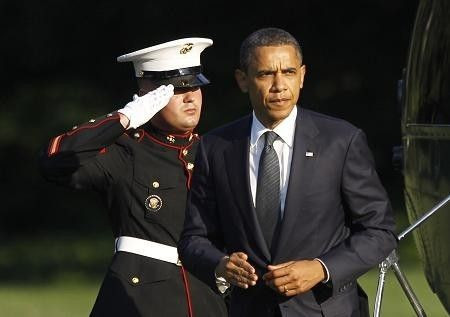Obama Issues Military Detention Waiver for Non-Citizen Suspected Terrorists

President Barack Obama reasserted his authority over detainee policy on Tuesday, issuing waivers that exempt broad categories of terrorism suspects from being held in military custody.
The Senate passed a bill in December mandating that the military, rather than U.S. law enforcement, have custody of non-citizens suspected of being members of al Qaeda or its allies. The measure provoked a fierce debate and prompted a rebuke from the Obama administration, which said the requirement would hamstring law enforcement and complicate counterterrorism operations.
After a decade of settled jurisprudence on detention authority, Congress must be careful not to open a whole new series of legal questions that will distract from our efforts to protect the country, the White House said in a statement at the time, adding that the detention mandate would tie the hands of our intelligence and law enforcement professionals.
While the media was fixated on the Republican presidential primaries in Arizona and Michigan on Tuesday night, Obama quietly eviscerated the military detention requirement. The waivers shield broad categories of suspects from being placed in military detention, including when doing so would make the suspect less likely to cooperate or confess; when a foreign country would refuse to extradite a suspect placed in military custody; when the suspect is a legal permanent resident who committed an offense in the United States; and when state or local law enforcement, rather than federal authorities, made the arrest.
Under the law, the attorney general must consult top national security officials to determine whether there is clear and convincing evidence that a suspect should be handled by the military. In addition to considering the new waiver categories, the attorney general would be empowered to exempt suspects on a case-by-case basis.
Essentially, that means it is unlikely that terror suspects would be transfered to the military. While the Obama administration has angered civil liberties advocates by continuing indefinite detention for terrorism suspects and refusing to end military trials, the waivers signal the administration's desire to handle terrorism cases stemming from the United States through the civilian justice system.
Put simply, policy under [the new military detention provision enacted by Congress] is no different than policy before it, Benjamin Wittes, a Brookings Institute scholar, wrote on his Lawfare blog. The FBI has custody of people it arrests domestically unless and until the Justice Department feels like yielding custody to the military-which, under this administration, it never will.
A trio of Republican senators released a statement questioning the move and calling for a Senate Armed Services Committee hearing.
We are particularly concerned that some of these regulations may contradict the intent of the detainee provisions of the National Defense Authorization Act passed by Congress last year, said Sen. John McCain, R-Ariz., Sen. Kelly Ayotte, R-N.H., and Sen. Lindsey Graham, R-.S.C.
--
© Copyright IBTimes 2024. All rights reserved.





















